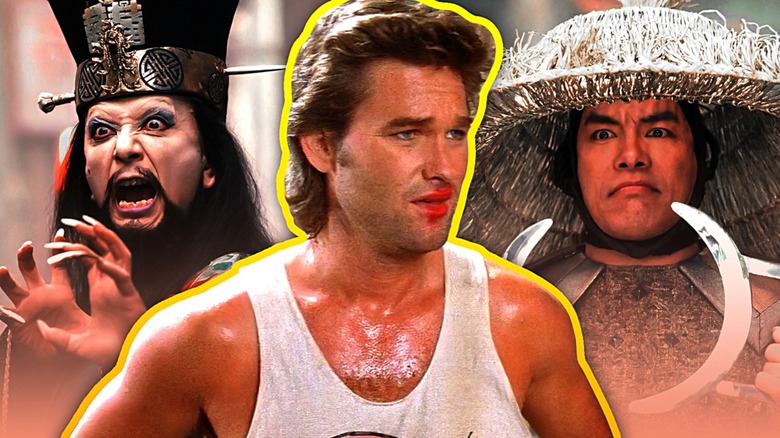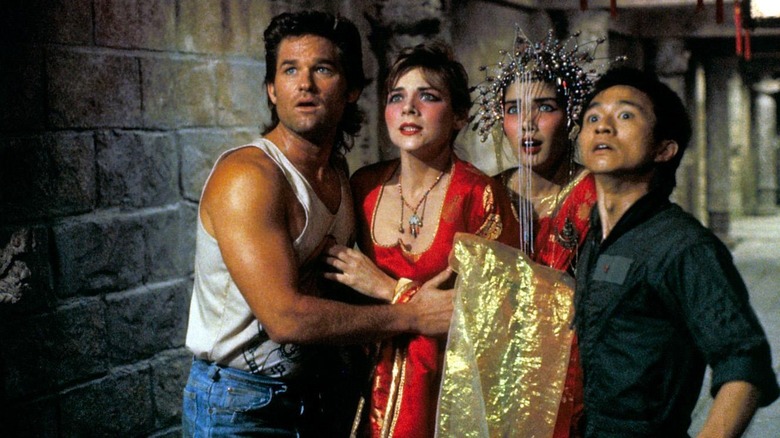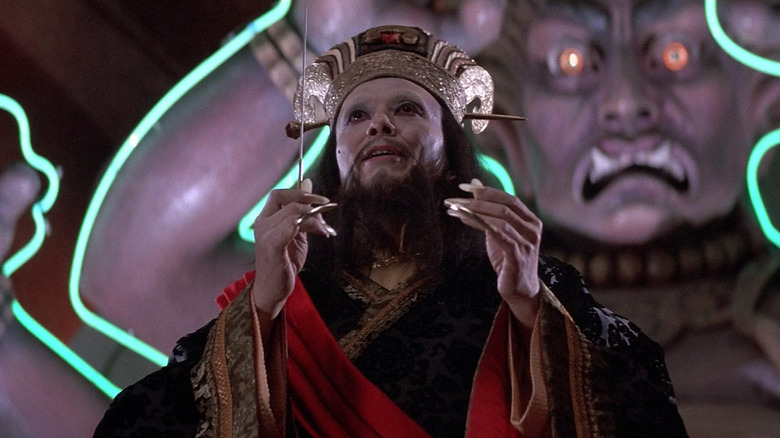Why Big Trouble In Little China's Marketing Campaign Left Kurt Russell Disappointed
John Carpenter's 1986 action-comedy "Big Trouble in Little China" is an odd duck. The plot involves an ancient wizard named Lo Pan (James Hong) who aims to kidnap, marry, and then sacrifice a green-eyed woman to break a curse he is under. The woman in question is Miao Yin (Suzee Pai), the fiancée of Wang Chi (Dennis Dun), who, fortunately, knows a little bit about evil wizards and ancient Chinese warriors. It will be up to Wang to rescue Miao Yin from Lo Pan. Also kidnapped is the green-eyed Gracie (Kim Cattrall), beloved by the dumb-as-rocks blowhard Jack Burton (Kurt Russell), essentially Wang's sidekick.
The gag of the movie is that Jack doesn't really seem to understand that he's a sidekick, and behaves like the action hero. Indeed, the whole movie seems to be a martial arts movie told from the perspective of the American guest star. Russell was featured most prominently on the film's advertising materials — it's an American production after all — and his character's name was often listed up at the top of ads. Newspaper slogans featured phrases like "Jack Burton's in for some serious trouble, and you're in for some serious fun."
The previews for "Big Trouble in Little China" also highlighted Jack as the main character. Indeed, the previews leaned heavily on Jack Burton's name. It didn't really work. "Big Trouble in Little China" was a pretty big bomb (making $11 million on a $25 million budget), and both Russell and Carpenter — speaking on the "Big Trouble" DVD commentary track — credit its failure, at least partially, to the "Burton"-forward ad campaign. Well, that, and the fact that "Big Trouble" came out in the summer of 1986, which was a notoriously busy time for blockbusters.
Who is Jack Burton?
Looking a month in either direction of "Big Trouble in Little China" — released on July 2 — finds a string of recognizable hits beloved by the Gen-Xers who saw them at the time. The summer of 1986 saw the release of "Top Gun," "Short Circuit," "Poltergeist II: The Other Side," "Raw Deal," "SpaceCamp," "Ferris Bueller's Day Off," "The Karate Kid Part II," "Labyrinth," "The Great Mouse Detective," "About Last Night," "Psycho III," "Aliens," and "Vamp." Although not all of these were top-grossing blockbusters, there was clearly an abundance of options at the movies, leaving a weirdo martial arts movie like "Big Trouble in Little China" in the dust. It also didn't help that a film called simply "Big Trouble" also came out on May 30.
On the DVD commentary track for "Big Trouble in Little China," Russell bemoaned the film's limp ad campaign. The previews asked audiences tantalizingly "Who is Jack Burton?" and Russell's first instinct was to shoot back "Who gives a s***? I don't know, and I don't care." It was clear that the film's advertising agency was trying to attach a certain degree of mystery to Jack Burton, talking him up as if he was the next Indiana Jones. In actuality, he was more like Remo Williams. The studio tried to forcibly insert a new name into the pop consciousness. And, no, it didn't happen. No one cared to find out who this Jack Burton was, and Kurt Russell's presence in the role didn't do much to bolster interest.
Who is Jack Burton? Before I brought it up, did you even remember Russell's character's name?
Jack Burton is nobody
It would take several years, a healthy re-discovery on home video, and a lot of airings on cable TV before "Big Trouble in Little China" would be accepted as a legitimate cult hit. In 2024, it has been embraced as the enjoyable send-up of 1970s Hong Kong cinema that it was intended to be. The kids who saw it on cable TV as youths have now grown up with a deep affection for "Big Trouble in Little China," and it has since spun off into its own niche product in the pop culture firmament; there are elaborate board games devoted to it.
No thanks to that 1986 ad campaign, though. Not only did Russell hate the "Who is Jack Burton?" approach, but he also hated the painting on the poster. The poster was painted by the legendary Drew Struzan, and the portrait of Russell is, in Struzan's style, unbearably flattering, but Russell didn't think Jack Burton looked like him. He admitted that he looked a little bit too much like Jeff Bridges.
Like the movie itself, however, Struzan's poster has also been roundly accepted by a cult audience, and there may be a few people reading this right now who have the "Big Trouble in Little China" poster on their walls right now.
It's hard to pin a film's success or failure on any single element; sometimes success or failure seems unpredictable and random. At the very least, a fun, kooky romp like Carpenter's 1986 comedy was eventually embraced. But any plans for a Jack Burton sequel pretty much died in 1986 when it tanked at the box office.


